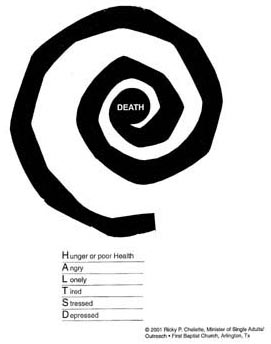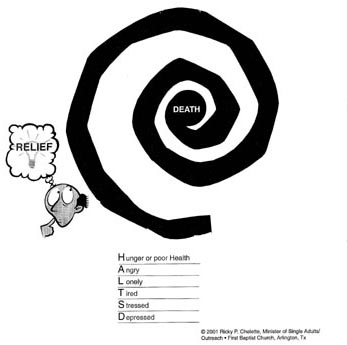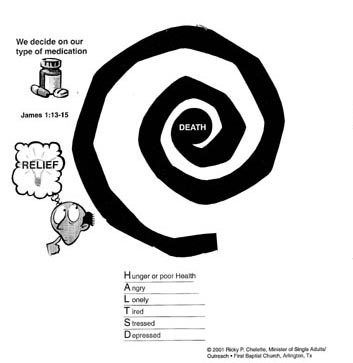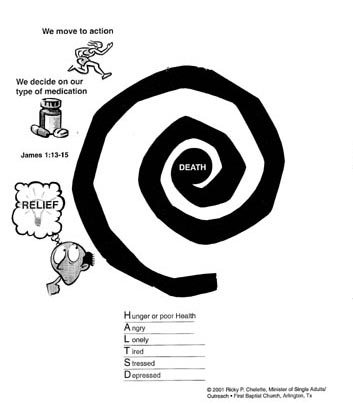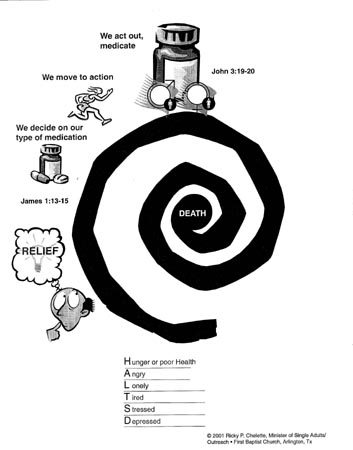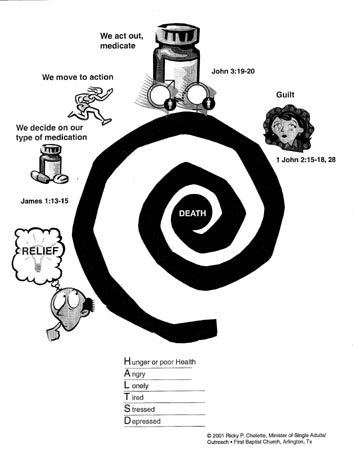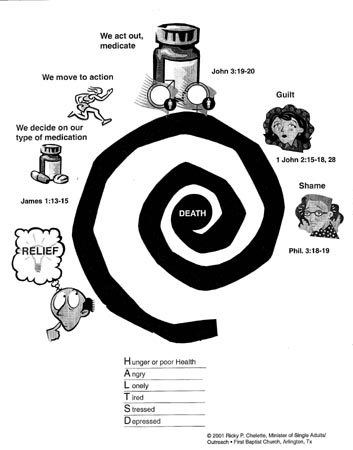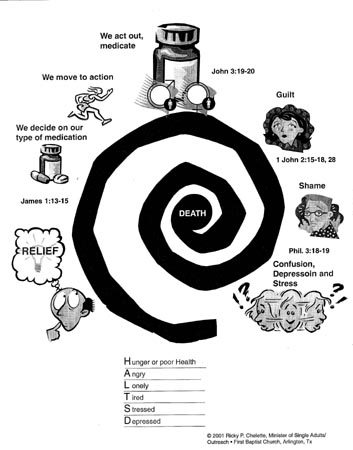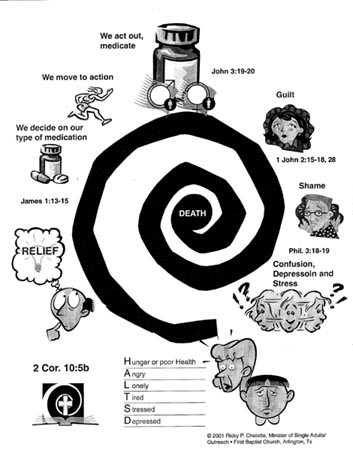Paul Rutherford explains the lies he believed and to which he was in bondage about pornography, until Jesus helped him achieve sexual sobriety.
Introduction—But Really, a Prologue. A Really Important Prologue.
Internet pornography use is ubiquitous. The metric you use to support that statement doesn’t seem to matter: percent of internet users who consume it, number of bits of data flowing through the Internet, or even cash currency. It is a huge business. And the internet distributes pornography at levels historically unprecedented. It quickly became easy to access, cheap to acquire, and anonymous to consume.
I am myself no stranger to the consumption of internet pornography. To be clear, consuming pornographic material is not appropriate for a believer in Jesus Christ. Our website has more information on this. But I don’t think that principle needs repeating; my older brothers in the faith have been very clear about that.
In this article I want to share with you some insights the Lord has taught me through my struggle to be free of an addiction to internet pornography. I will be frank. And rather than condemning you for your sin (the enemy does a plenty good job at that), I will address a number of beliefs you may find you hold, even if unwittingly. Then you’ll see how those beliefs do not reflect reality—they are all a lie.
I Like Porn Because It’s Easy

My name is Paul, and I am a missionary. In the late 2000’s the Lord made plain to me that I was no longer dabbling with internet pornography, it had become my master. I was addicted, and I needed help.
By God’s grace I found help through a group recovery program at a local church. I later placed membership there, and have found freedom from this life-sucking addiction. Still, I carry the wounds inflicted by my choices years ago. The balm of Christ has healed them. I’m walking today in the freedom only forgiveness from the Father can provide. By God’s grace I have a beautiful wife, a blessed marriage, and three wonderful children.
Hindsight, though, is 20/20, and while I must be vigilant every day to guard against temptation, time and space have provided me perspective to gain clarity on the beliefs that got me into my addiction in the first place and kept me down for some time. I’ve since come to realize there were five lies in particular that I was believing. Let me share them with you, along with the truth that will set you free.
The first reason I love porn is because it is easy. It is easy to access, yes—as easy to access as turning on my smart phone. Years ago it was far more difficult to acquire. Now I carry temptation in my pocket! How dangerous! Only by God’s grace am I sober from porn today.
When I say I love porn because it’s easy, what I mean is it’s easily to get what I want from sex without all the hard work. Pursuing my wife is hard work. Empathy is not easily mustered. Emotional intimacy with her is no easy task. Pornography on the other hand, is just a tap away. If all I’m looking for is that release, surely porn is a better choice because it’s an easier route. Same destination, right? No harm no foul. Right?
Wrong.
Nope. Not true. Pornography is in fact NOT easy because it circumvents God’s good plan for sex.
Pornography only seems to be easy. That is just an appearance. Ultimately porn complicates my life. Confessing relapse to my wife? Not easy. Confessing lust to my small group and others? Difficult. The wound I inflicted on my wife by spiritually cheating on her? Not easy for her. The months of work required to earn back her trust? Not easy.
The ease of pornography is a lie. The truth is, it complicates my life and makes it harder. If you are tied up in it, please confess it to the Lord today, and confess it to another human being. The first step to getting better is simple. Admit you have a problem.
I Like Porn Because It’s Fast
I love pornography because it’s fast. I get pleasure fast. I get satisfaction quickly. I get what I want, and I get it now. Sound familiar? It’s not unlike that famous song lyric from the 70’s, “Wham bam, thank you, ma’am.”
What I love about pornography is that it gives me what I want, and it gives it to me fast. No waiting involved. No patience required. Faster is better. Isn’t it? Why rent the “Eight Minute Abs” workout VHS from the local video store, when “Seven Minute Abs” is on the shelf right next to it? (As referenced from the 90s film Tommy Boy starring Chris Farley.)
What I love about pornography is how it satisfies quickly. Pornography only asks for a few minutes of my time and then gives me what I want.
Do you know how long it takes to pursue my wife? It took months to get to know her when we were dating. It took months to plan, prepare, then execute our wedding. Now that we’re married, do you know how long it takes to pursue her, so that she feels close to me, intimately and emotionally connected? That takes a LOT longer than the time required to log on to the internet.
The problem with loving pornography because it’s fast, is that eventually it isn’t. The truth is pornography has sapped years from my life.
There was a season I was a casual user of pornography, and on a fine spring afternoon, I finished up work early for the day and looked forward to what adventures I might pursue with the remainder of that evening. By the time I went to bed that night, I’d wasted hours of my life consuming internet pornography.
The problem with pornography is that it is fast, until it requires hours of your life you would rather have spent otherwise. Furthermore, this trend continued for months, even years!
Proverbs 14:12 says, “There is a way that seems right to a man, but its end is the way to death.” The fast pleasure of pornography seemed to me like the right way in the moment. Now I realize it is the way to death—death of my relationship with the Lord because sin separates me from Him; it is death to intimacy with my wife; death to time and energy that could have been better spend elsewhere doing things other than pornography itself.
The death I experienced led to so much loss because of the work required in my relationships to clean up the mess of my sin. It was a process over several years. I loved pornography initially because it was fast. it’s not, and it’s not worth it!
I Like Porn Because I’m in Charge
The third reason I love pornography is because I am in charge. I get what I want and risk nothing in return. I remain in control. I give up nothing. I risk nothing. It’s everything a man-fearing, people-pleaser could ask for. Except that’s not the true identity for a believer in Jesus Christ. And if you identify with Christ, then this applies to you.
Pornography is great because I remain in charge. I have control. That whole fear of rejection thing is not a problem. Since I’m not entering into a real relationship with a real person, I’m not taking any of those risks. I don’t have to reveal anything about myself. I don’t even have to give my name. I don’t have to share my anxieties, my fears, or my dreams. I don’t have to share anything.
With porn, I don’t have to admit that I’m human in any way. And this appeal is strong for those of us who are cowards. And I am one. Since I fear rejection—and porn never risks rejection—it gives the false illusion of security. It’s a lie.
Sadly, this means what I love about pornography is how it enables my cowardice.
This has no place for the genuine Christ-follower.
If you have taken a wife, you are called to love that woman as Christ has loved His Church. Jesus Christ is the paragon of courage, bravery, and vulnerability. If you are a husband, then the standard by which to compare yourself as a husband is not to your neighbor but to Christ Himself. That is a high call, friend—much higher than you or I are accustomed to, I’m afraid.
I like pornography because I feel like I’m in charge. But that is a lie. Being strung out, addicted to pornography, shows that you definitely are not in charge. It’s a farce. It’s a lie.
The truth is I have far less control than I desire. When it come to my wife’s opinion of me, I have no control. Zero. I have a lot of influence, but no control. That’s the risk inherent to the job of husbanding a wife. That’s the risk inherent in marriage.
Marital love is a self-giving love. As Jesus died to love His bride when she was in sin, so you too, husband, are called to love your bride even if you are in fact right, and she is in fact wrong. Love her anyway. Love her always. It will require you to take risks. But it’s ok. Those risks are good—both for you, your wife, your family, and the family of God.
I Like Porn Because I Get What I Want
The fourth reason I love porn is because I get what I want. That’s what we all want, isn’t it? We want what we want, and we want it now. That somehow seems like America’s motto these days. Give me what I want but don’t make me work for it. Capitalism does have some downsides.
In moments of temptation all I feel is my desire for gratification. I’ve learned from years now of recovery that I rationalize the pursuit of fulfilling this temptation by telling myself how good I’ve been, how many good things I’ve done, or perhaps with how much I’ve sacrificed to do the right thing.
If you can’t tell already, the problem with this reason is that it is purely selfish. It’s the definition of immaturity. You want what you want, and you don’t care who you hurt to get it—be that your spouse, the Lord, your community, your children, or even yourself.
The Bible calls this “gratification of the flesh.” In Ephesians 2:1-3 the author, Paul, admits that all believers in Jesus once lived this way, giving into the desires and inclinations of our sinful flesh. Insisting on getting what I want is sin.
The worst part is that I wasn’t actually getting what I wanted. That too was a lie. My flesh was merely chasing that fleeting feeling. The truth is, I have a God-given desire for the feeling, but also so much more: a desire for connection to another person, a desire to belong, a desire for intimacy—the thrill of knowing another and being known by another.
Porn never delivers any of these. Porn delivers emptiness, isolation, and disappointment. Marriage, on the other hand, delivers intimacy, satisfaction, and as a bonus, sanctification. This was God’s intent from the beginning. You can also have this today if you are married. And it is God’s will for you to find all your healthy sexual desire to be fulfilled by your spouse. It can happen. There is hope, and it is in Christ.
Don’t believe the lie that porn will give you what you want. It’s a bill of goods. Learn from my mistakes, please. “There is a way that seems right to a man, but its end is the way to death.” (Proverbs 14:12)
I Like Porn Because It’s Cheap
The fifth and last reason I will share that I love pornography is because it’s cheap. It doesn’t cost my anything. There is so much free pornography on the internet I struggled in my addiction for years, consuming hundreds of hours of content, and never paid a dime.
At the time I told myself I wasn’t paying for it. That made me feel better about myself. At least it made me feel better about my budget.
The problem with pornography being cheap is that it’s a lie. Pornography is NOT cheap. It’s exceedingly costly. My problem was that I was looking at it strictly from the material point of view. I was looking only at dollar signs. How many dollars did I spend on my addiction? None? Ok, well no harm to the budget, no foul. The worldview problem with this is that I was behaving like a materialist, like a naturalist, as if the natural, physical, material world were what mattered most.
Don’t get me wrong—the material world matters, but so does the spiritual. And that was what I was ignoring.
The truth is, pornography cost me SO much. It has cost me hours of my life wasted, given away to sin. It has cost me trust and intimacy with my wife, gone for whole seasons at a time due to relapse. It has cost me a job opportunity. It has cost me the intimacy of being known by my community of brothers who would love me, care for me, and shepherd me into a joy-filled, holy, pure, and blameless walk with the Lord. It has cost me time, intimacy, and joy from being with the Lord, knowing Him, and enjoying Him.
What costs more than your relationship with the Father?
I loved porn because it was cheap—well, free in terms of dollars. But in relational capital it has cost me something that can’t be purchased with ALL the dollars in the world. It isn’t enough.
I’m grateful to God that He paid the awful cost of my sin, when the Father sent His Son, Jesus Christ, to die on the cross and rise again. Jesus’ death satisfied my sin’s debt—the one I owed the Father.
Pornography is so expensive. It cost Jesus His life. Please, if you’re addicted, turn to the Father today. Follow the counsel of James 5:16 today: “Confess your sins to each other and pray for each other that you may be healed.” I know you’re scared. But trust me that this fear you feel for confessing and taking that first step out of addiction is from the enemy, not the Lord. Trust the Lord. He will make your path straight. He is good, and He loves you.
|
Why I Love Porn (The Lies) |
How the Story Ends (The Truth) |
| It’s easy | But it doesn’t satisfy |
| It’s fast | But it sapped my life for years. |
| I’m in charge | Until I couldn’t stop. |
| I get what I want | Except I hate myself after. |
| It’s cheap | But it nearly cost me my marriage. |
©2023 Probe Ministries
